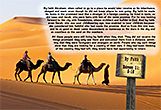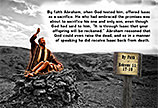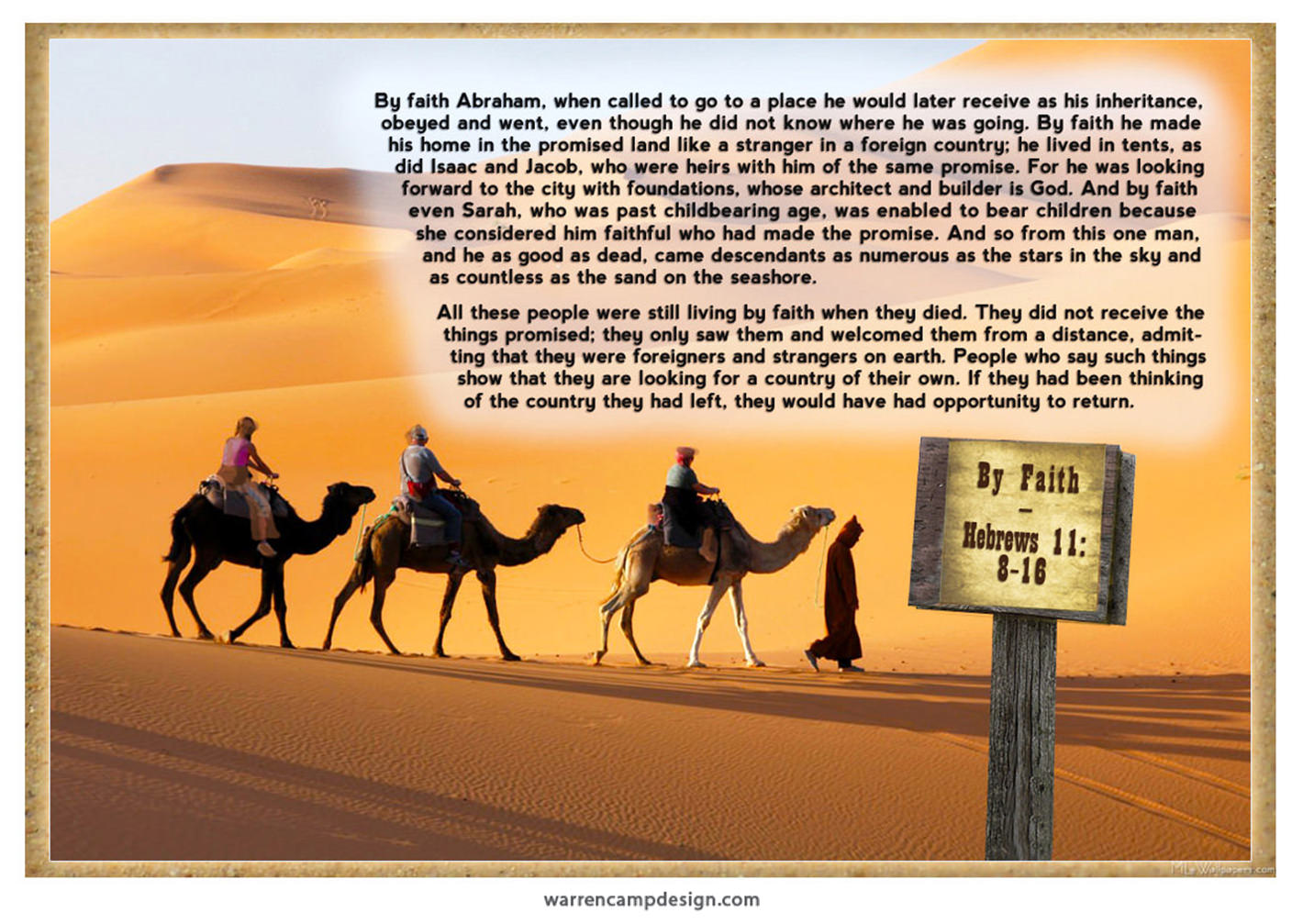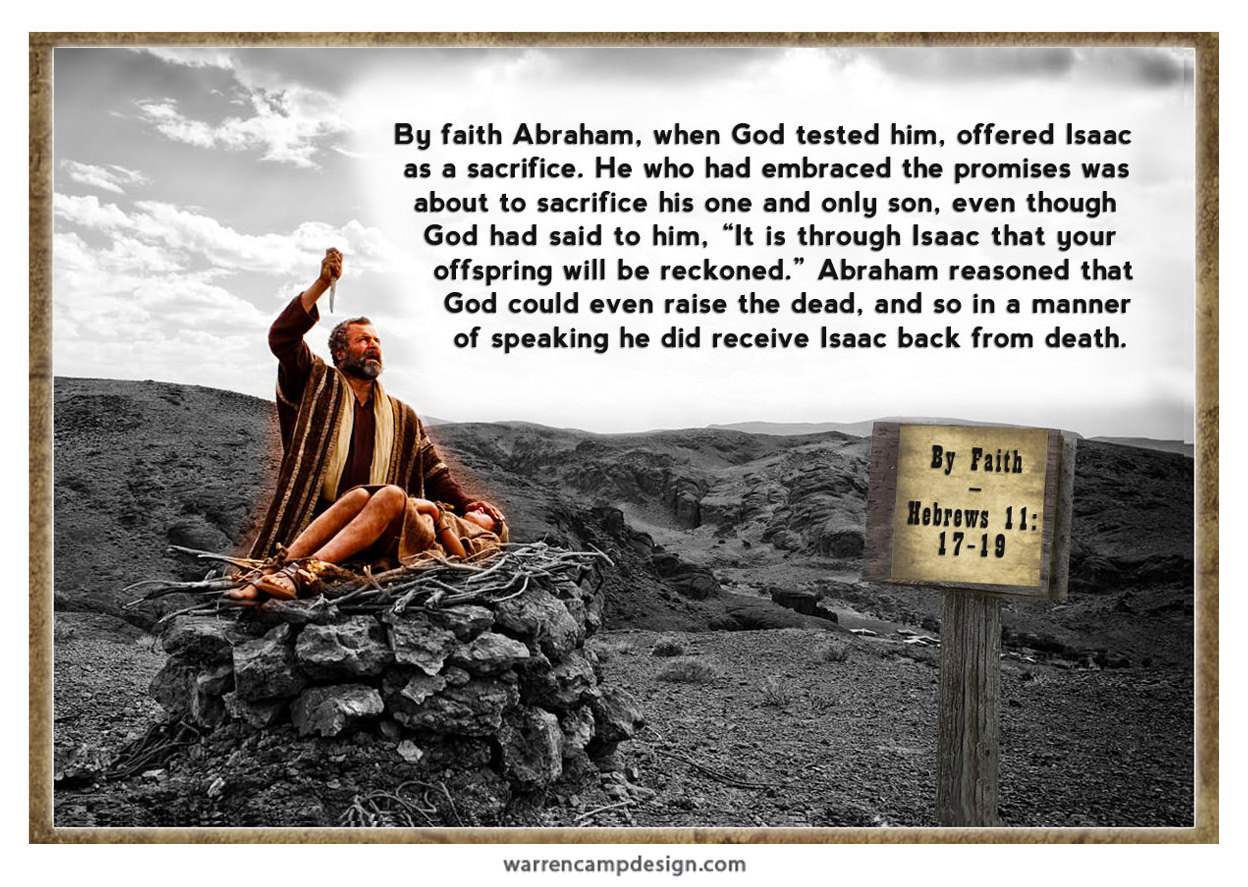Hebrews 11:8–19 . . .
“Examples of Abraham’s Faith”
We examined in our last commentary titled "Faith: Definition and Examples," we explored the likely meaning of 11:1–7, highlighting the encouragement the author gave to his audience of persecuted, saved Jewish Christians, motivating them to endure and survive faithfully. He defined "faith," then elaborated on it being the means of endurance for Christians then and now. He then punctuated "faith" by presenting three faithful exemplars from the Old Testament, Abel, Enoch, and Noah, often referred to as honorary members of the Hall of Faith." Today's continued presentation provides a few more of the many examples of faith in the lives of Israel's ancestors. It's worth noting that all of chapter 11's Hall of Faith legends are presented in chronological order (vv. 4–38).
In his epistle to the Hebrews, our author afforded the most space to describing exemplars of faith to Patriarch Abraham (11:8–19), whom we'll focus on significantly today. He's been introduced in "Hebrews" as a recipient of God’s promises (6:13) and a shining example of the many who shared in those promises. He again showed up in 7:4–6 with Melchizedek, with whom we find established the basis for the author’s dramatic claim: that the exalted Christ holds the office of heaven’s High Priest.
Obedience to the Lord’s Calling (11:8–12)
The author speaks of Abraham’s faithful response to the Lord’s calling (v. 8) and his promises (vv. 9, 11, 17), language not found but implied in the Genesis narrative (highlighted below). Abraham left his own country at God’s command, without knowing his destination. In addition, by faith, he offered up his son, Isaac, as a blood sacrifice.
8By faith Abraham, when called to go to a place he would later receive as his inheritance, obeyed and went, even though he did not know where he was going. 9By faith he made his home in the promised land like a stranger in a foreign country; he lived in tents, as did Isaac and Jacob, who were heirs with him of the same promise. 10For he was looking forward to the city with foundations, whose architect and builder is God. 11And by faith even Sarah, who was past childbearing age, was enabled to bear children because she considered him faithful who had made the promise. 12And so from this one man, and he as good as dead, came descendants as numerous as the stars in the sky and as countless as the sand on the seashore (11:8–12).
Abraham's examples God commanded Abram (Abraham’s original name) to "Go from your country, your people, and your father’s household to the land I will show you" (Gen. 12:1). God didn’t give him a road map or an identifiable destination. His first act of obedience was simply to step out and take the course, from his home in Haran to that unknown venue. That was a great step of faith; in those days, one’s security was established by his or her parents and extended family. Seeing Abram respond, without reservation to God’s command, was truly a magnificent example of faith.
Abram's destination was Canaan, later known as the Promised Land (Gen. 12:5–6). But it turned out later that Abraham experienced Canaan only as a tent-dwelling "stranger in a foreign country," not as a citizen. Tents served as shelter for nomadic herdsmen who required grazing land and water for their animals. However, living in more permanent houses was a safer and more secure type of dwelling.
By an act of faith, Abraham said "Yes" to God’s call to travel to an unknown place that would become his home. Upon leaving, he had no idea where he was going. By faith, he lived in the country that Father God promised him, enduring as a stranger who camped in tents instead of living in houses "as did Isaac and Jacob, who were heirs with him of the same promise" (v. 9). They looked forward to living in a better city "with foundations." Abraham endured and succeeded by keeping his eye on an unseen city that had real-yet-eternal foundations — it was the city designed and built by God.
About Abraham’s "faith" examples, we're told these things (11:8–10): (1) He obeyed God by leaving his homeland for a place that God had promised, about which he'd never seen or heard; (2) he lived as a "sojourner" in that land, "like a stranger in a foreign country," never possessing it, excepting the plots on which he and Sarah were buried; and (3) he longed for a lasting city that Father God had designed and built. But please note: His faith was less than stellar.
Pastor/teacher/commentator Bob Deffinbaugh says this about Abraham's strength, after reading the account in Gen. 12:10–20: "Abraham’s faith is far from strong in this text. He leaves the promised land and sojourns in Egypt where he fears for his own life, even though God has made great promises to him. These promises presume that Abraham will live. But somehow he fears that God will not be able to protect him in Egypt, beyond the borders of the Promised Land. So he instructs Sarai to lie about her relationship to him (okay, it was a half-truth, but that was the same as a full-blown lie — ask Pharaoh). Doing so, he put Sarai (the mother-to-be of the promised child) into Pharaoh’s harem. Even Pharaoh could see the wrong here. Nevertheless, God spared Sarai’s honor (sexual purity) and Abram’s life."
Continuing to highlight Abraham's compromised faith, Deffinbaugh writes this: "One would hope that this was a lesson Abraham would have to learn but once, but this was not the case. A number of years later, Abraham and Sarah settled in Gerar, where virtually the same failure occurs once again (Gen. 20:2–13). . . Abraham should have learned his lesson earlier. He had already failed this way once before and had been corrected for it. Even though he failed, God protected Sarah and him. He now knows for certain that it is Sarah who is to become the mother of the child that God promised Abraham (Gen. 17:16; 18:9–10). The time for Sarah to conceive is near, and yet Abraham’s feeble faith places his wife in the harem of yet another king, Abimelech." Incidentally, thousands of years later God didn't remember Abraham's delayed and continual disobedience, only his faith.
By faith, barren Sarah, then an old woman, miraculously became pregnant because she believed the One who made a promise would do as he'd promised. That’s how it happened; because of Sarah and Abraham's faith, from one man’s dead and shriveled loins, his offspring numbered in the millions. Their faith had a positive impact on more lives than they'd ever dreamed. Yet, like her husband, Sarah’s faith wasn't perfect: She first laughed in unbelief of God's promises (Gen. 18:9–15); then she learned to "laugh in faith" (21:6). No matter, Sarah counted God as faithful, and God blessed Sarah with a son. Incidentally, the author uses the term "By faith" repetitively (21 times in this chapter in the NIV, and 38 times throughout this epistle, as shown on this list).
Abraham and Sarah’s “Faith” Lesson (vv. 13–16)
Each one of these people of faith died without ever having in their hands the things that God had promised; nevertheless, they still believed. How did they do it? Each saw, heard, and welcomed his promises, admitting that they were all transients in the world. People who lived this way made it plain that they were looking for their own home country. If they were homesick for their previous country, they could have returned any time they wanted. But they sought a far better country than that — a heavenly country. That's why God was so proud of them and designed and created a city that awaited their arrival.
13All these people were still living by faith when they died. They did not receive the things promised; they only saw them and welcomed them from a distance, admitting that they were foreigners and strangers on earth. 14People who say such things show that they are looking for a country of their own. 15If they had been thinking of the country they had left, they would have had opportunity to return. 16Instead, they were longing for a better country — a heavenly one. Therefore God is not ashamed to be called their God, for he has prepared a city for them (11:13–16).
Despite Father God's promise to Abraham and Sarah, who believed his promise, they and everyone of "these people were still living by faith when they died." Sadly for them, they never received or realized his promised things; they were able only to see and appreciatively welcome the promised results by faith, though fulfillment appeared far away. The two always acted on God's promise with the understanding that their new environment wasn't to become their home (vv. 13–14). Living by faith is easier when we remember that this earthly world isn't our home. Abraham, Sarah, and all of the Hall of Faith inductees were confident that Yahweh had a better and more enduring home for them, with him in heaven (v. 16).
Just as those ancestors who received their Promised Land abodes, the spiritual ancestors singled out here in chapter 11 were "foreigners and strangers on earth" (v. 13) in search of God’s heavenly city (v. 10). The eventual destination of the ancestors’ sojourn wouldn't be Canaan, the land to whom God had promised Abraham (Gen. 12:1–3). Instead, it was "the city with foundations, whose architect and builder is God" (Heb. 11:10, 16). It was truly "a country of their own," the future inheritance of God’s people (11:8). Until their arrival, they were resident aliens of an earthly venue (v. 13). Because of the certainties and blessings granted to earth's citizens, God's people lived by faith in God. It was his promise of an eternal home — a Sabbath rest — that motivated their enduring obedience to him and his holy word.
As homeless nomads, Abraham and Sarah's promised future was threatened by her barrenness, their spiritual tests, and the fragile progression that follows each predecessor's death. In the end, the Church’s ancestors fully and faithfully trusted God’s promises "even though [they] did not know where [they were] going" (v. 8), seeing only "the things promised" by God. The many ancestors "did not receive the things promised; they only saw them and welcomed them from a distance" (v. 13). These pilgrims had a vision of living in their own land. Abraham's descendants wouldn’t receive what had been promised to them for many years to come.
If Abraham and Sarah had chosen instead to return to Haran, they could have done so; they "had opportunity to return" (v. 15). Their families would have welcomed them back; they could have lived in houses, not tents. But they chose not to do so. Because God had called them, by faith they chose to honor and obey his command. "Therefore God is not ashamed to be called their God, for he has prepared a city for them" (v. 16). Though all were far from perfect, he was pleased to be known by them as their God. For them and us, he chooses to remember one's faith rather than one's sins. That said, everyone bold enough to believe that God is truly Lord Almighty, being confident in the reality of heaven and Jesus' gift of eternal life, can comfortably know that they bring him pleasure.
What Abraham Knew by Faith (vv. 17–19)
By faith, Abraham, at the time of testing, offered Isaac back to God. Acting in faith, he was as ready to return the promised son, "his one and only son," as he had been to receive him — and this, after he'd already been told, "Your descendants shall come from Isaac." Abraham figured that if God wanted to, he could raise the dead. In a sense, that’s what happened when he received Isaac back, alive, removed from the altar.
17By faith Abraham, when God tested him, offered Isaac as a sacrifice. He who had embraced the promises was about to sacrifice his one and only son, 18even though God had said to him, “It is through Isaac that your offspring will be reckoned” [quoted from Gen. 21:12]. 19Abraham reasoned that God could even raise the dead, and so in a manner of speaking he did receive Isaac back from death (11:17–19).
We're told in these three closing verses why Abraham was so cooperative with God about slaying Isaac, "his one and only son." Abraham's faith is commended here in the incident involving his altar sacrifice of Isaac (Gen. 22). His faith was based upon God's previous promise to Abraham in Gen. 17:19: "Then God said, 'Yes, but your wife Sarah will bear you a son, and you will call him Isaac. I will establish my covenant with him as an everlasting covenant for his descendants after him.'"
It's important to clarify v. 17's statement that Isaac was Abraham's "one and only" son. The Greek monogenes, for "one and only" or "begotten," means pertaining to what is unique in the sense of being the only one of the same kind or class. Abraham, of course, did have another son, Ishmael (the son of his fleshly attempt to fulfill God’s promise, causing God to not recognize Ishmael as Abraham's only begotten son). Abraham also had later sons by Keturah. But Isaac was a unique son, having been born as a result of God's specific promise to Abraham. Isaac, therefore, could be called a monogenes son, since he was the only one of his kind. Our author undoubtedly knew of Abraham's other sons, however, he pointed to Isaac as being unique, the only son through whom God's promise made in Gen. 17:19 had been fulfilled.
Since Abraham had received that promise of God — that God's promises would continue through Isaac — he literally believed that if God allowed him to go through with the sacrifice, Isaac was as good as dead and God would surely raise him from the dead, in a manner that prefigured Jesus' resurrection. Since Isaac had no children then, by faith, Abraham knew that he'd return home with a living, breathing son Isaac. Now that's faith!
In summation, when Abraham was confronted after receiving a promise and a command from God, which appeared to contradict one other, he acted the way that all believers should act: By faith, he obeyed God's command and let omnipotent God take care of fulfilling his promises.
Closing Considerations (from Dr. Charles Stanley)
Acquiring great faith Faith increases as a result of our obedience in little things. We marvel at Abraham's willingness to offer up Isaac at the Lord's command. But have you ever considered many of his smaller steps of submission that prepared the way for that enormous test of faith?
Throughout his lifetime, Abraham obeyed God. At the Lord's command, he left his country, was circumcised (Gen. 17:10, 26), conceived Isaac when he and his wife were old (21:1–3), and sent his son Ishmael away (21:9–14). By the time he was asked to offer Isaac as a sacrifice, he already knew that God would always be faithful to His promises. Abraham's previous experiences had taught him to trust the Lord.
In the same way, each small step of obedience solidifies our confidence in God. Then, when he challenges us with a more difficult assignment, a firm foundation of assurance enables us to trust and obey. Great acts of faith flow from our past interactions with the Lord. By neglecting his simple commands, we miss priceless opportunities to witness His faithfulness.
Are you finding it hard to trust God for something big? Maybe that's because you've ignored those small and insignificant promptings of the Holy Spirit. God considered each of his commands important; He promises to reward every act of obedience, regardless of size. Great faith begins with little steps.
- Q. 1 How is faith demonstrated or explained in each of the three examples from Abraham's life (vv. 8–12, 17–19)?
- Q. 2 [Read vv. 13–16 aloud.] What does it mean to you to be an alien and a stranger on earth? . . . How might you feel like a stranger in this world?
Hebrews 11:8–19
New International Version (NIV) or view it in a different version by clicking here.
— Listen to chapter 11, narrated by Max McLean.




